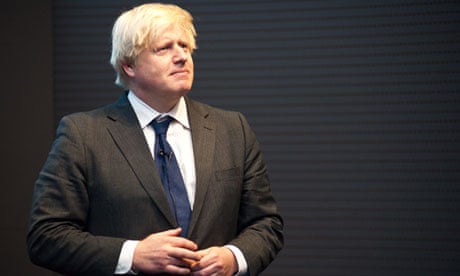"For too long London has been an economic giant, a political giant but a fiscal infant … It's high time London was treated in a more grownup, a more mature way, as a great city in the way other great cities are" – Boris Johnson, May 2013
By the summer of 2030, David Cameron wasn't a name that meant much to most Britons. Ed Miliband? He barely rated a mention from the Will Straws and Euan Blairs now running the Labour dynasty. Yet there was one early-21st-century politician who could claim a permanent legacy. Little urchins would break off from intense communion with their iJobs™ to pull off a passable impersonation. "Cripes!" They'd say, while ruffling their hair. "Crikey!"
Boris Johnson, who else? He was the godfather and loudhailer of the campaign to make London independent from the rest of Britain. The fight had taken decades, but at last it had triumphed: even while Scotland remained part of the UK, the erstwhile capital had broken away and was now its own city-state. This latest signatory to the UN charter was officially dubbed Great London, but most people used an informal name that honoured its inspiration. They called it Borisstan.
It all began as mere mayoral whimsy. There had long been gripes that London was "a first-class city attached to a second-class country". Then there was the famous suggestion in the Telegraph at the end of 2012 that "the overtaxed south needs its own party". All right, so that was Kelvin MacKenzie, the outrider's outrider. And it was only the Telegraph, now just a series of hyper-local websites for Sue Ryder shops in each of the Home Counties.
But what the former Sun man's famous editorial antennae had picked up on was a prejudice that Londoners and their neighbours across the south-east were simply subsidising the rest of the country. They'd done it during the boom, when the City apparently chipped in so much to the Treasury coffers. And they did it again during the lesser depression of 2008-2020 as the capital motored ahead, even while the rest of Britain spun its wheels in perma-austerity.
Couple that popular reading of the economic dynamics with the changing social relations between London and the rest of the country. Where previous regional success, such as that of the Midlands in the 1930s, had drawn in and employed people from elsewhere in Britain, this wasn't the case during the capital's great boom. As the LSE's Ian Gordon and others had shown, fewer Britons settled in London between 1997 and 2006 than left it. No, the big influx into the capital was from those born outside the UK, whether they came to work in its private-equity shops or its coffee bars. One of the ways London grew to be a world city during the bubble was by sweating migrant labour, sometimes for a lot of money, but usually for a pittance.
Put that explosion in diversity next to the capital's economic and social liberalism, and you had a city that was very different from the rest of the country. And as Borisstan's historians would always remind readers: don't forget the footling details. The way that the capital established its own web domain in 2013: .london. The setting up of a new thinktank devoted to research on the capital. The lobbying done by bankers to preserve their freedom from regulations and extra tax and, well, any bothersome social obligations. And the reports commissioned by Mayor Johnson on how London should claw back more of the taxes it paid to the national government.
Thus what began as a call for Holyrood-style devolution got louder and more ambitious, until in 2029 Londoners found themselves voting in a referendum on whether to go independent. Boris himself had long left the political stage, contenting himself as a non-exec for the world's biggest, Shanghai-based, bank. But from the bikes, to the buses to the museums; Londoners knew they were Boris's people.
There were anxieties of course. What currency would the new city-state have? Borisstan would eventually enter a currency union with the Chinese renminbi. Where would the energy supplies come from? How would Londoners get rid of their landfill? As soon became apparent: "London" had always meant two different things. There was the small central area, where new properties were sold off-plan to foreign tycoons and where Londoners were nothing more than glorified butlers to the global plutocracy. This was the city as a docking station for international capital.
Then there was the London that had once been a hive of light industry but was now nothing more than retail parks and old council housing. Out here in 2013, the gross value added (a kind of local GDP) was just £13,000 a head; while in inner London it was £60,000 per person. Outer Londoners ("aborigines", as they were called in some of the plush hotels) simply got bussed in and out of the high-security centre for work.
Guardianistas down the ages from JA Hobson to Will Hutton had warned of this split between the capital and the country. Who would pay for Borisstan's equivalent of Crossrail now? Londoners had pulled in greater public spending, and claimed more infrastructure cash than Scotland, Wales and Northern Ireland together. Who would foot the bill for the next banking crisis?
But these were all questions for the future. Right now, quite far down the Thames estuary, work was beginning on a small airport. The HSBC-Boris Island, it was to be called.











